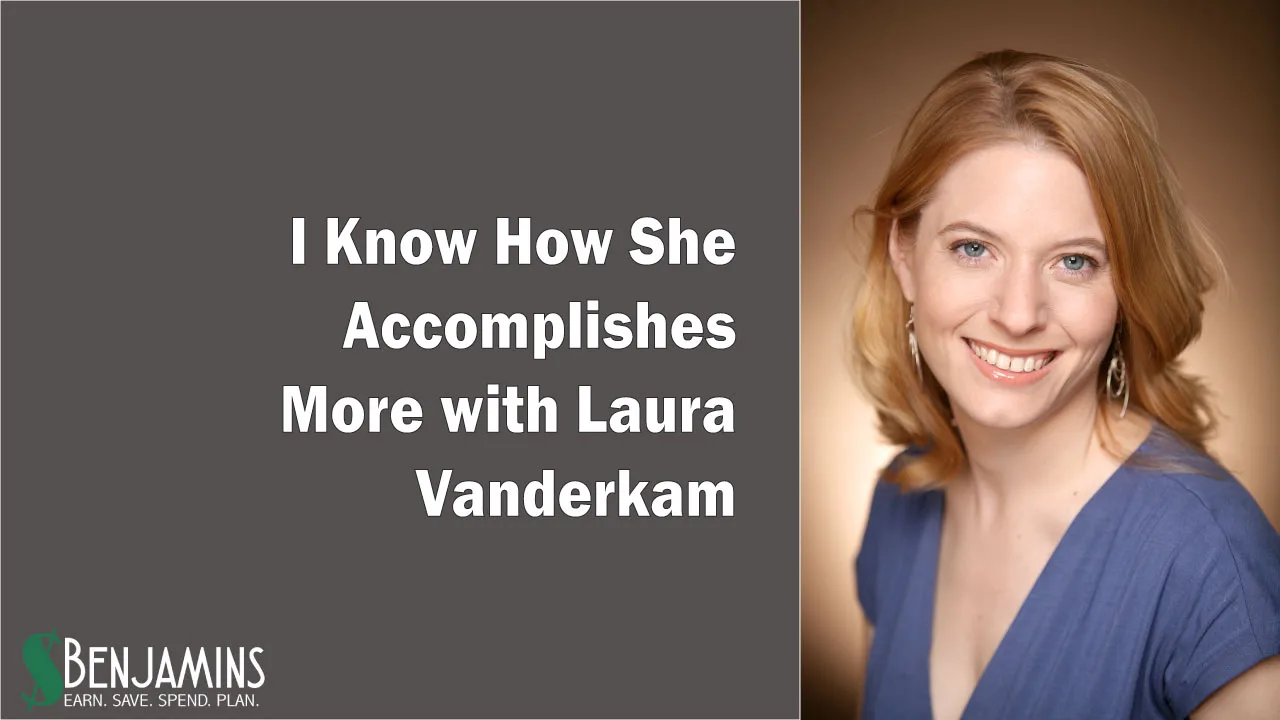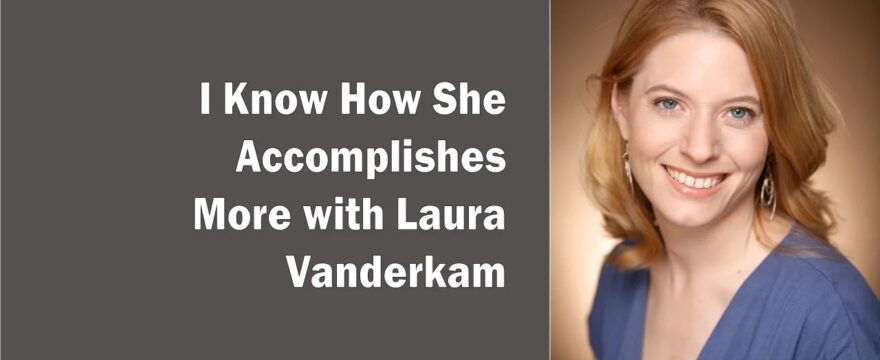
Laura Vanderkam, the author of I Know How She Does It, rejoins Joe and OG down in the basement to talk time management. She’d visited before to talk about her awesome book, What Successful People Do Before Breakfast.
Joe: Welcome back, Laura.
Laura: Thank you for having me back here.
Joe: My biggest takeaway from your book is that successful people do not have to work more hours.
Laura: No they don’t. Often there are ways you can re-purpose the hours you are currently “working” to turn them into slightly more efficient and productive hours. That means you can work more without actually working more.
I did a time diary study of 1001 days in the lives of women who were earning six figures or more and have families. They were working longer than many people but not around the clock. They were working 44 hours a week on average.
Joe: You talk in your book about how the time diary study is more like a mosaic than filling in boxes.
Laura: You can look at a time log a couple of ways. The one I had most people fill out is a slightly supped-up Excel spreadsheet. There is nothing exciting about a spreadsheet. Some people have a problem shoehorning life into cells on a grid. I get that.
You can twist that and ask, “what if we view this as a mosaic?” These cells on the grid are actually tiles in the mosaic, and we are the mosaic makers deciding how we will place those tiles. We decide what we want the mosaic of our lives to look like hour by hour. It’s more artistic and creative if you view it that way.
Joe: Instead of focusing on working more or less, this study seems to be about being intentional with your time.
Laura: It is. I think that is the secret to success. Life is lived in hours….choosing how to spend those hours with a goal of making them meaningful and enjoyable for ourselves and those we care about. It vastly increases the chances that those things will happen.
Joe: What are some of the key tips if you want to cut your hours back at work but stay productive?
Laura: First, look at is how you’re spending your day now. I recommend people keep track of their time if they want to spend it better. We tend to treat meetings with a reverence that they don’t always deserve. The easiest way to save an hour a day is to look at your calendar and find one meeting where you don’t add enough value to justify your presence.
We spend way too much time in our inboxes. Not every e-mail has to be answered. If you are responding to everything that comes in, you’ll spend your whole day doing it. You will find yourself at 4:30pm not getting to the stuff you need for the next morning. That only buys you a late night.
Perform triage at 3:00 pm to make sure everything that needs to get done that day is being addressed. The email will always be there. You will never get to the bottom of your inbox.
Another technique, paradoxically, is to take real breaks during your day. If you don’t take real breaks you’ll take “fake breaks.” By fake breaks, I mean by 2:00 pm, if you’ve eaten lunch at your desk, you’ll find yourself realizing that you’ve been following Twitter links for the past half hour with no idea what you did with that time. The problem with this type of break is that it is not rejuvenating like getting up from your desk to have a real lunch, take a walk, or meet a friend for coffee would be.
Joe: We talked last time about how successful people spend an hour on Sundays to plan out your day. How did this change when you met David Allen?
Laura: I used to plan my week mostly on Sunday night. He casually mentioned to me that a lot of his clients were planning on Fridays. The more I’ve thought about it, the more brilliant an idea I think it is. Friday afternoon for me is generally dead time. I’m not willing to start anything new. I am willing to think about what “future me” should be doing. The opportunity cost of this planning time is pretty low.
The other upside is if I think about what I need to do and I realize I need to talk to XYZ person next week I can send them a note. Chances are they are still at their desk, so they can respond and we can get it scheduled. I then know where it fits in the week before the week starts. The other thing about planning on Friday is that you have a plan going into Monday and you don’t have to think about it over the weekend… If you know what you are supposed to be doing on Monday by the time Friday ends you can relax a little bit more (over the weekend).
A lot of helpful hints to help both men and women. Laura goes more in depth about the time diary study and you can hear how it reminds him of the play Rent. Laura and Joe discuss more about the 3:00 pm triage and how that makes it easier for you to be there with your family when you are not working.
Do you want to work more? Laura and Joe also discuss how to view your week through a WEEKLY lens than a DAILY lens helps with task batching. You can find that interview here on the Stacking Benjamins Podcast. Laura’s book, I Know How She Does It can be found in Big Ben’s Store here.


Leave a Reply